Keyword research is important if you want your online marketing efforts to bring you positive ROI in a short period of time.
Choose the wrong keywords and you’ll find yourself wasting time and money.
Here are the top 12 keyword research methods you can use to generate more organic traffic this 2021.
In the interest of transparency, this post may contain affiliate links to the tools mentioned. At no additional cost to you, if you click through and decide to purchase, I will earn a commission. Regardless, I only recommend products I use and believe will add value to you.
This list is not meant to be exhaustive. Rather, use it as a starting point to prioritize which keywords to target for your website.
Also, while you can create a list of keywords to target, having an SEO tool will help speed this process up and help you make better decisions.
1. Use Seed Keywords to Understand the Industry
The most often recommended step is to identify a couple of seed keywords for your industry. These core search terms are typically 1-2 words/phrases that people often use.
- Digital Marketing
- Cafes
- Anime
- Swimming Pools
Depending on the industry, you can also come up with a list of subtopics. For example, under digital marketing, you also have content marketing, SEO, and social media. Those are still seed terms (or head terms).
Plug these in your keyword research tool to get more ideas.
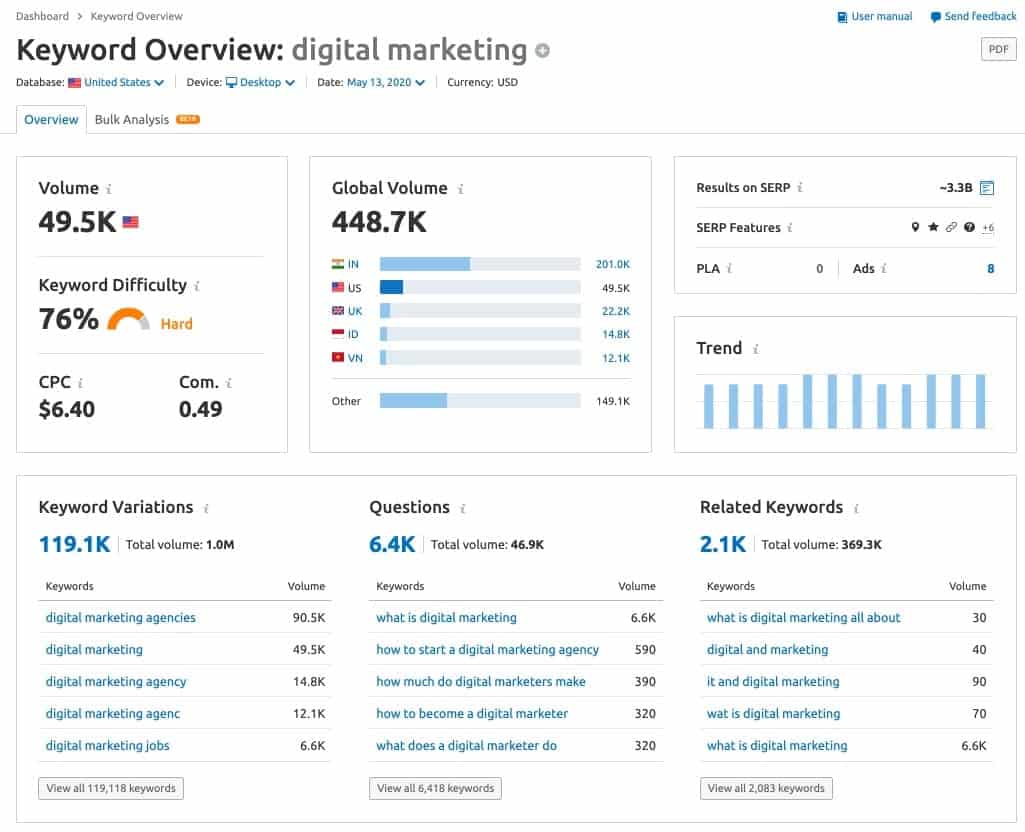
In the example above, you enter the head term “digital marketing,” you can see a lot of keyword variations.
Depending on the tool you’re using, you’ll get different keyword research metrics such as search volume, keyword difficulty, and other relevant metrics.
Jot down keywords that are relevant to your business. Or, if your keyword research tool allows it, add them to a keyword list. This allows you to go back to them later.
2. Group Keywords by Topic
As you begin your keyword research, you will notice a lot of keyword variations. These are keyword phrases that are similar to each other.
Let’s say you are trying to create content for “keyword research.” That’s my seed keyword (#1). In your keyword tool, you will then see a lot of different keywords you can target in your blog post.
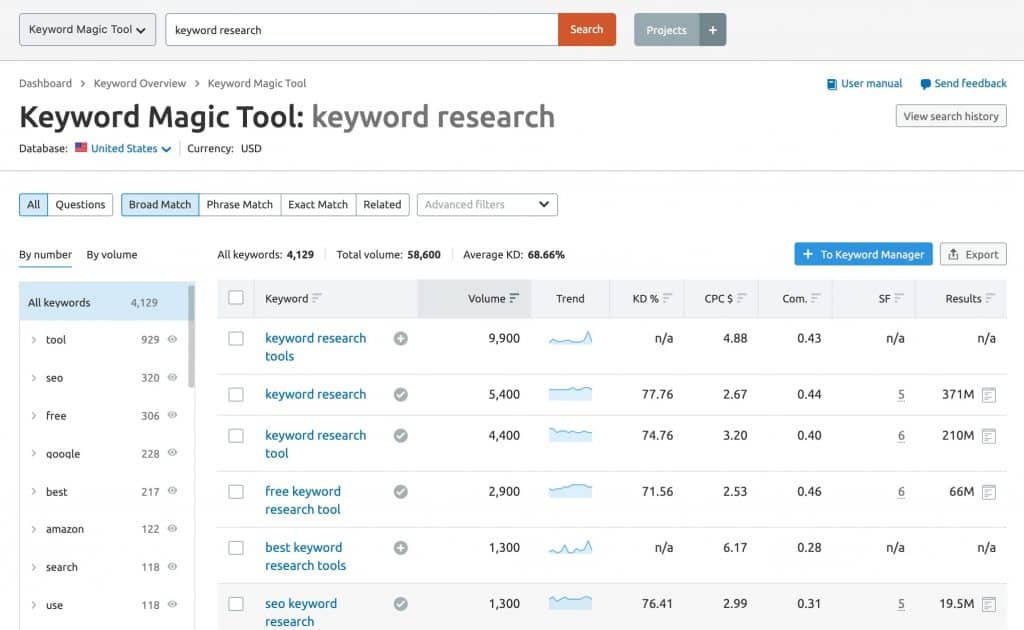
You can then group specific keywords together.
For example, if you’re planning to write an article on “keyword research tools”, you can group these keywords together:
- best keyword research tools
- best seo keyword research tools
- seo keyword research tools
- free keyword research tools
Then, as you write your article, you sprinkle them all over. Instead of using your main keyword over and over, you use the other variations instead.
3. Perform Competitor Keyword Research
If you want an easy way to research for keywords and topics to write about, then competitive research should be one of the first strategies you need to implement.
The idea is simple:
- Find their top keywords/pages. These are the ones that are driving them the most traffic and results (aka positions on search engines)
- Create a better version
Most keyword research tools also tell you which websites are your real SEO competitors. You do this by entering your own domain and it will look at the keywords you’re ranking for in the top 100 and then display which websites are also ranking for the same search terms. The more keywords you cover, the more likely they are your organic search competitors.
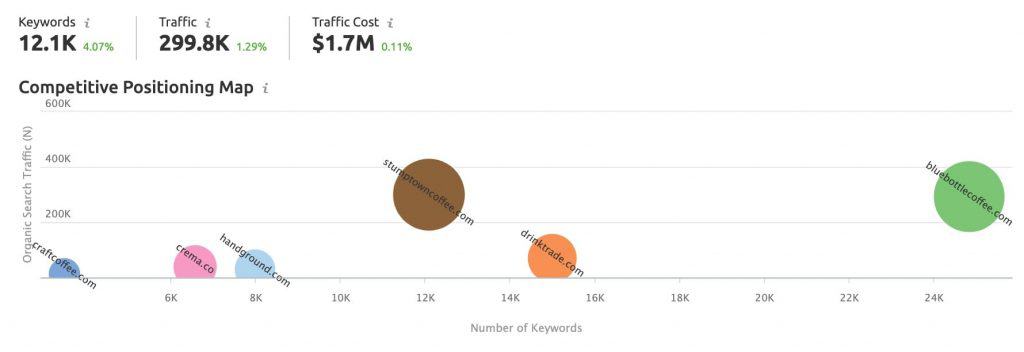
4. Do a Keyword Gap Analysis
Since you know who your competitors are, then can use a more advanced keyword research methodology called the content gap or keyword gap analysis.
The idea behind this tactic is to find keywords your competitors are targeting and ranking for that you might have overlooked.

It will be almost impossible to do this without a keyword research tool.
In the example above, the SEMRush Keyword Gap tool shows you various keywords that are missing in your own website, or search terms where you’re weak at compared to your competitors.
You can scan this list, add them to the keyword manager, and plan to address them.
Since your competitors are ranking for them, they are most likely relevant to your business as well.
5. Leverage Existing Data
This keyword research method is often overlooked by a lot of marketers.
Leverage existing data so you can rank higher and get more traffic.
You can do this by diving in Google Search Console. You can find each page on your website, what keywords they are ranking for, including relevant metrics such as impressions, clicks, and most importantly, its position on Google.
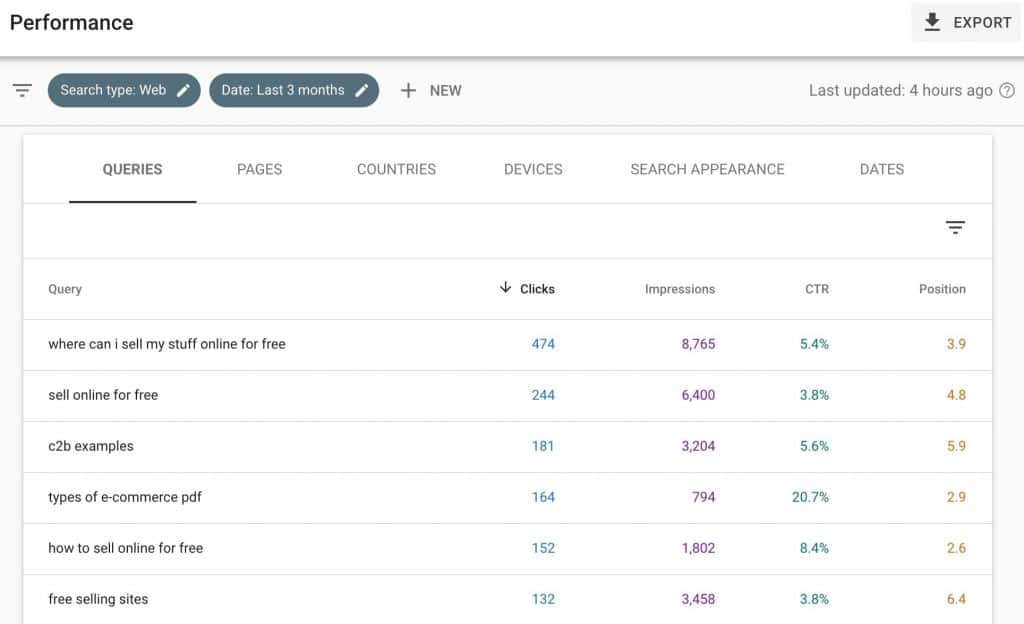
Depending on the data, you might notice a particular page might be ranking for unexpected keywords.
You can, then, use these to create a more targeted blog post around it.
Combine this with other research methodologies in this page and you have the ingredients of a high performing blog post.
6. Use the Classic High Volume, Low Difficulty Keywords Approach
This is the holy grail of keyword research: the high volume, low difficulty keywords approach.
As the name implies, you filter keywords that have a high monthly search volume that isn’t that difficult to rank high for.
You can combine this with other types of keyword research. For example, combining #1 (seed keyword) with this strategy gives you a couple of ideas to write content for.
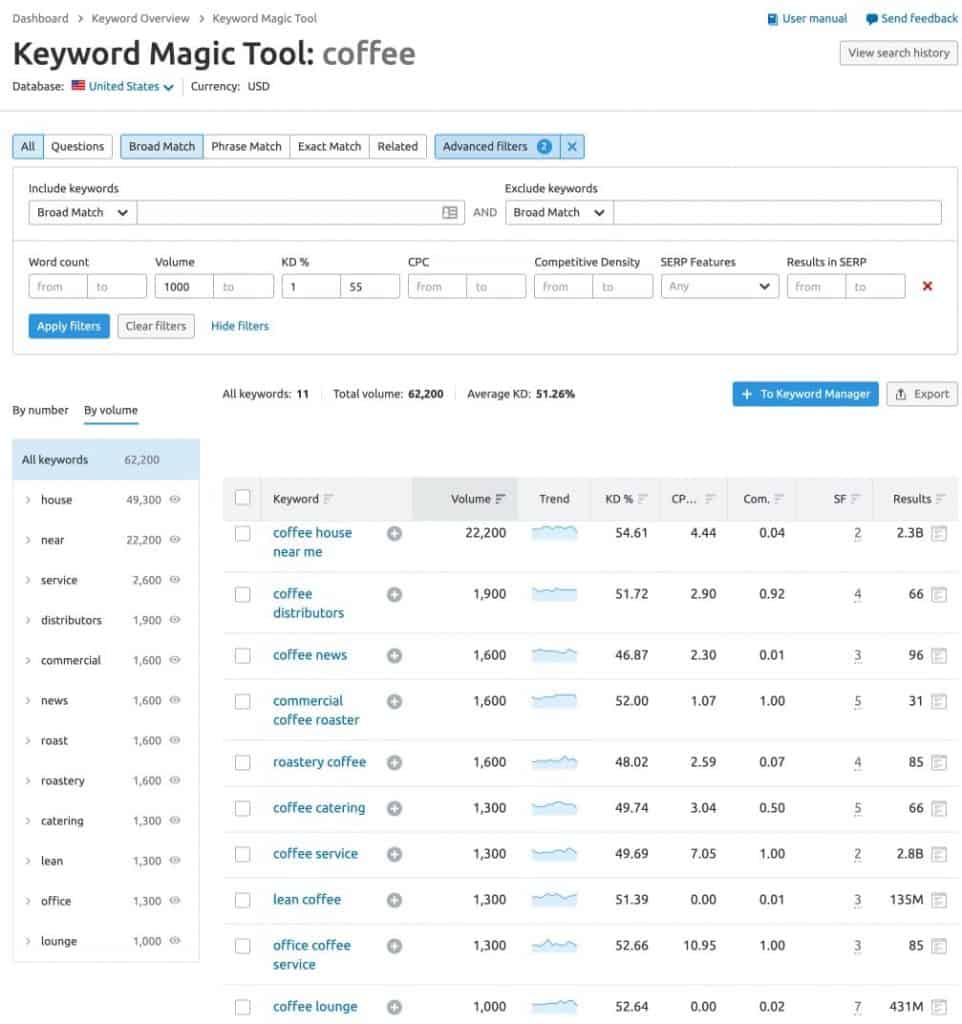
If you’re a coffee shop owner and you sell coffee beans, you might not have thought about ranking for “coffee distributors” or “coffee catering.”
Both have a high search volume (over 1000 per month) and low difficulty.
Plus, it also falls under the next keyword research method…
7. Prioritize High Commercial Intent Keywords
Whenever people like you and me search for something on Google, there is a specific purpose for these searches.
These are called search intent.
A high commercial intent is a search that has a high likelihood of purchasing a product or service. Oftentimes, these are long-tail keywords (see #8).
Take the example above. When someone searches for “coffee house near me,” that person is most likely looking to buy a coffee. Now.
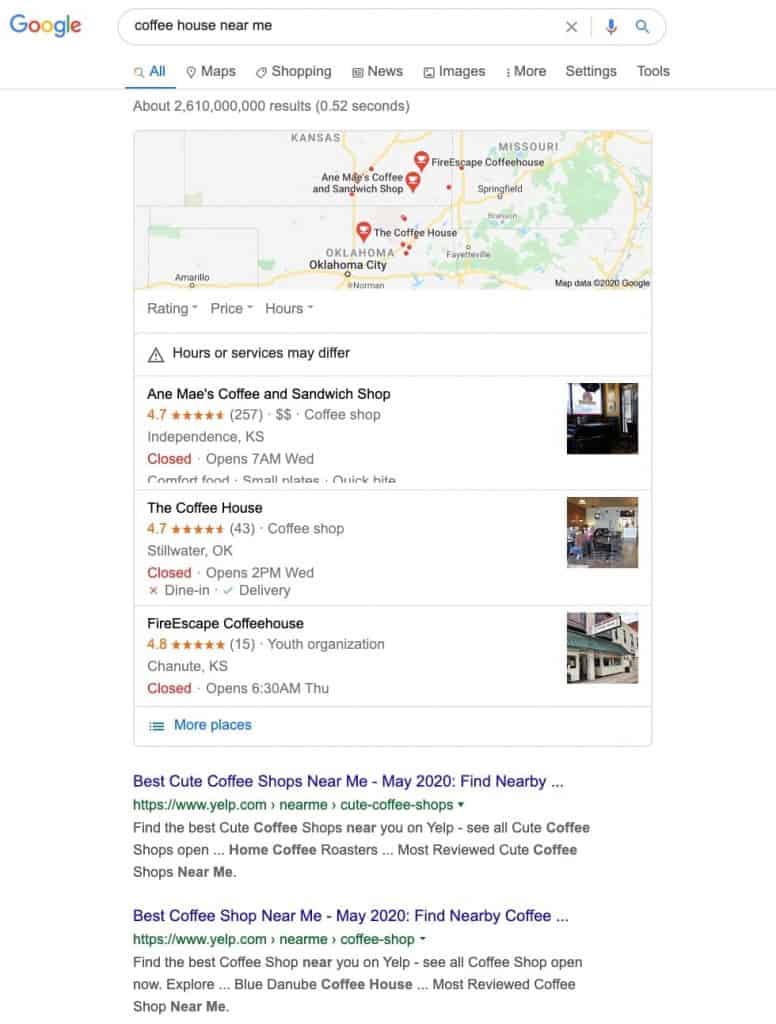
That’s why the search results includes a map with coffee shops in a particular location, and the top results are Yelp pages with a list of the best coffee shops.
This keyword research method is a great way to acquire more qualified traffic fast.
The more relevant you can make your page to match that intent, the more likely they are to convert.
8. Focus on Long-Tail Keywords
This method is also a standard in every keyword research guide.
Long-tail keywords are highly specific, often low volume. Here’s how it looks like on a graph.

Remember, long-tail keywords are not associated with word count alone.
You can’t (and shouldn’t try to) determine Keyword popularity by looking at the number of words in a query. Short search queries can be “long-tail” keywords, and long queries can be “head” keywords.
Tim Soulo
The key to finding long-tail keywords is it’s highly specific. Usually, these are longer terms with lower search volumes. Again, usually.
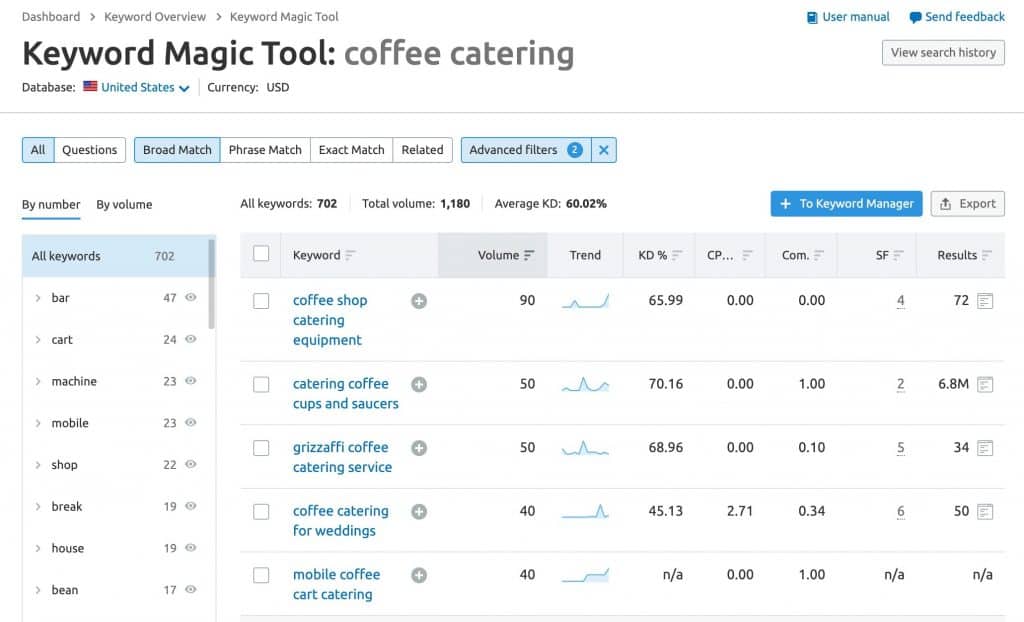
For example, after digging into the report and applying filters, I could create specific pages optimized for the following keywords:
- coffee catering (city that you serve) — Create a separate page for each city you’re operating in. If you’re a local business, including the city name in your landing page and adding your address makes it more relevant to users
- coffee shop catering equipment — If you sell equipment specific for this, create a page to match the intent behind this. Most likely, this is a coffee shop owner who is looking to enter that market.
- coffee catering for weddings — since this is specific for weddings, you’d want to create a page targeting this industry. So your page might include how your coffee bar setup looks like in a wedding setting.
Focusing on long-tail keywords helps you get quick wins for your website. You get qualified traffic and high chances of conversion.
9. Take Advantage of User-Generated Content and Communities
If you don’t have the budget for SEO tools, then you can use this keyword research method instead.
Search for groups and communities that are related to your industry.
Quora and Reddit are the top choices.
But depending on your industry, you can find Facebook or LinkedIn groups. You can also look into Slack, WhatsApp, or Telegram groups.
The idea is to find common problems, questions, and other issues that your product or service can solve. Look at polls or surveys.
If a lot of people are asking the question or there are a lot of answers or engagement around the topic, that’s a good sign that there is demand for it.

Another (free) area that you can get ideas for your blog posts is in your comments.
10. Use Customer Interviews and Surveys
This method is also underrated and often overlooked.
Ask your customers.
You can do this via phone calls, Zoom calls, face-to-face, email, or other survey tools.
Depending on the nature of your business, you can use this method.
- Show people a photo of your product
- Ask them what they would type into a search engine if they were looking for it
- Discover new attributes, concepts and synonyms you haven’t considered before
- Expand your keyword research by including all new terms
- Prioritize newly discovered queries by importance, relevance and volume
- Include top priority items in your copy, or define new landing pages if appropriate
This strategy is a combination of a lot of methods mentioned here.
But it bears more importance because it came from customers and actual people.
11. Don’t Forget Social Media
You can also use social media to research keywords or topics to write about. Just like the community/forums method, you find topics that resonate well and create content that’s similar, but better than what’s out there.
That’s how BuzzSumo first started.

You simply enter a keyword (your seed keyword) and it will show you the most shared content on different social media platforms.
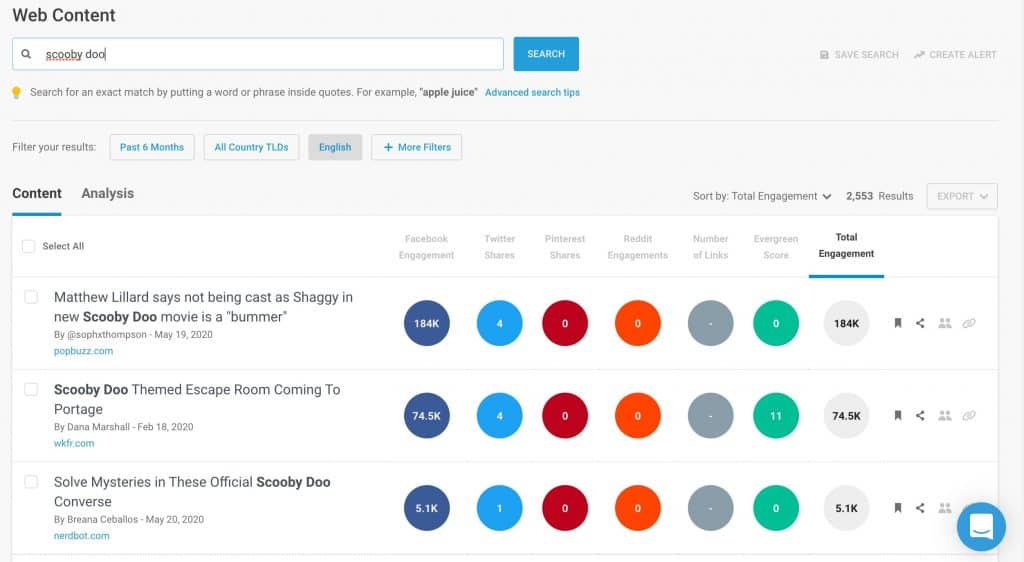
12. Try Visualization
The last keyword research method is to use visualization to help you find ideas that you may have overlooked.
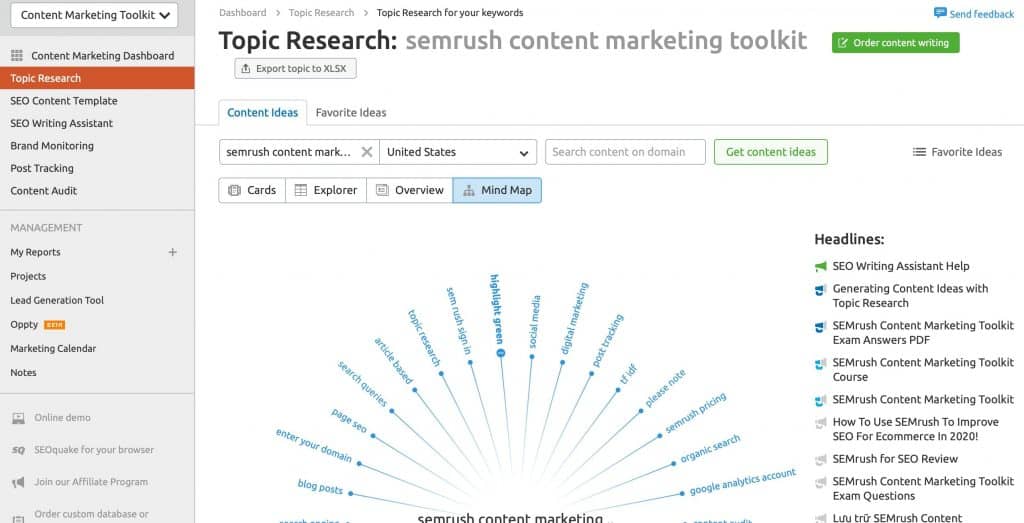
Oftentimes, another perspective helps.
There are various tools out there.
The most often recommended tool is Answer the Public. After typing in a keyword, it will show you a mind map that looks something like this.

As you can see, these mind maps are great prompts for keywords or topics you might have overlooked.
Conclusion
These are some keyword research methodologies you can experiment with today.
Combine multiple methods to get the best results.
If you end up having too many keywords to choose from, prioritize by search intent.
What do you think? Which of these keyword research methods have you used?
What’s the one method that brought you the biggest returns?
9 Responses
Hi there! Great post!
I would add two more tactics:
1. Check out the Wikipedia page to a specific topic. The way Wikipedia is build naturally shows you the most important keywords.
2. Check out the table of contents of books (for example on Amazon).
The keyword gap analysis is something I stumbled upon many times within the last couple of weeks. Will definitely try it myself!
Cheers!
Thanks Daniel. Those two tips are interesting. I’ll update this post next week to incorporate those tactics. Really appreciate taking the time to share.
Hey! Cool, happy to help! 😉
I believe that keyword research is first step towards creating a successful marketing campaign and you have mentioned here great tips and tricks for keyword research. I personally use reddit and quora for generating keyword ideas and content ideas. It gives you unique content ideas that ultimately gives you traffic.
Regards,
Ovais Mirza
yes, i agree. I haven’t used reddit recently, but i do get ideas a lot from Quora. I take a look at topics with lots of views and engagement and use that as inputs in my content. Thanks for dropping by!
Best experience with this article I gain lot of knowledge form this article
please publish more such kinds if articles
This article is very helpful. I am sharing it!
Thank you!
Best experience with this article I gain lot of knowledge form this article
please publish more such kinds if articles